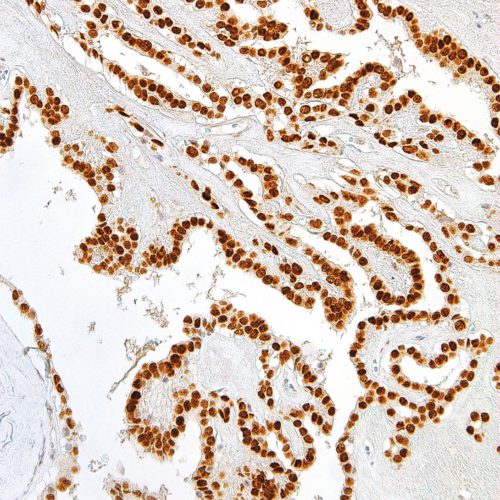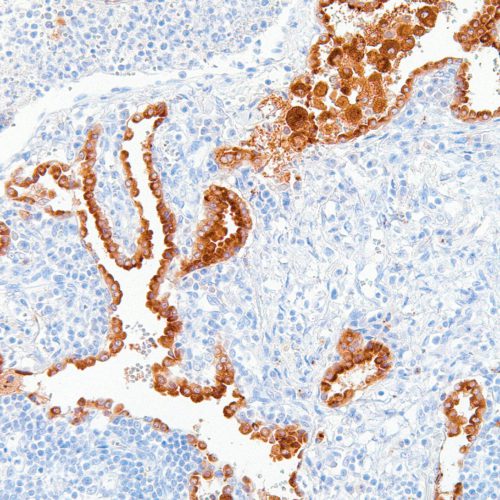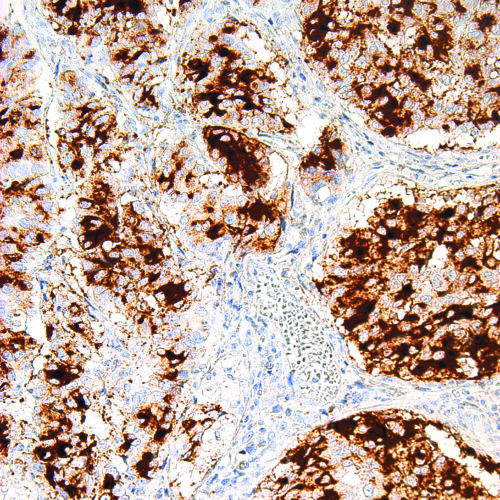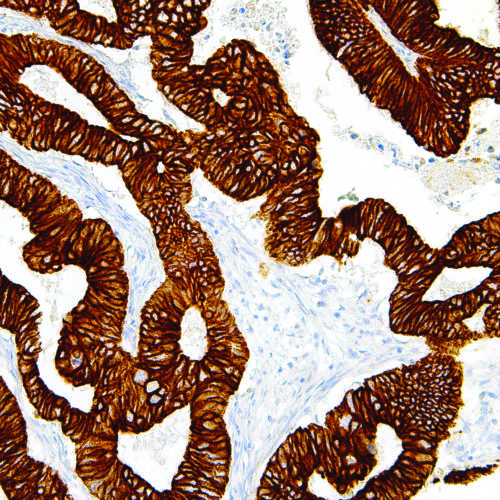High quality products to support Pathologists and Biological and Environmental Scientists
GeneAb™ TTF-1
$53.75 – $172.00Thyroid Transcription Factor 1 (TTF-1) is present in diencephalon, lung, and thyroid. Anti-TTF-1 stains thyroid and thyroid-derived tumors, and is therefore used for distinguishing lung adenocarcinoma from germ cell tumors, malignant mesothelioma, and metastatic carcinomas from organs other than the thyroid. It is also useful for distinguishing small cell lung carcinoma from lymphoid infiltrates, and pulmonary from non-pulmonary adenocarcinomas in malignant effusions. The ability to distinguish between pulmonary and non-pulmonary adenocarcinomas is particularly useful in identifying tumors that have metastasized to the brain.
GeneAb™ Napsin A
$75.25 – $295.62Napsin A is a pepsin-like aspartic proteinase, closely related to Napsin B, expressed mainly in the lung and kidney and which is involved in the correct folding, targeting, and control of aspartic proteinase zymogens. Napsin A expression has been indicated in type II pneumocytes and adenocarcinomas of the lung and kidney. Anti-Napsin A is also useful for differentiating between primary lung adenocarcinomas and adenocarcinomas of other organs, due to the high specificity expression of Napsin A in adenocarcinomas of the lung.
GeneAb™ BG8, LewisY
$123.62 – $419.25BG8 LewisY, also known as LewisY blood antigen or simply BG8, is a blood group antigen that has been identified in many studies as a potential marker for differentiation between pulmonary adenocarcinoma (PACA) and epithelioid mesothelioma (EM). It has been reported that sensitivity of non-mesothelial antigens for adenocarcinoma is organ-dependent. When attempting to differentiate epithelioid mesothelioma from adenocarcinoma, BG8 LewisY performed at a sensitivity of 98% in the breast cancer group, and 100% in the lung cancer group.
GeneAb™ Cytokeratin 19
$69.88 – $268.75Cytokeratin 19 (CK19) forms intermediate filaments found in the intracytoplasmic cytoskeleton of epithelial tissue and provides mechanical support. Anti-Cytokeratin 19 stains epithelia and epithelial malignancies such as carcinomas of the colon, stomach, pancreas, biliary tract, liver, and breast. Cytokeratin 19 is a useful marker for distinguishing hepatocellular carcinoma from intrahepatic cholangiocarcinoma. This differentiation is improved when stained in combination with Cytokeratin 7, CAM5.2l, Ber-EP4/MOC31, HepPar1 and TTF1. Cytokeratin 19 staining can also be used to recognize thyroid papillary carcinomas.



